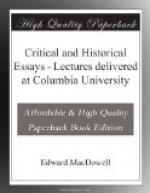Much of the lack of independence of opinion about music arises from want of familiarity with its material. Thus, after dinner, our forefathers were accustomed to sing catches which were entirely destitute of anything approaching music.
Music contains certain elements which affect the nerves of the mind and body, and thus possesses the power of direct appeal to the public,—a power to a great extent denied to the other arts. This sensuous influence over the hearer is often mistaken for the aim and end of all music. With this in mind, one may forgive the rather puzzling remarks so often met with; for instance, those of a certain English bishop that “Music did not affect him either intellectually or emotionally, only pleasurably,” adding, “Every art should keep within its own realm; and that of music was concerned with pleasing combinations of sound.” In declaring that the sensation of hearing music was pleasant to him, and that to produce that sensation was the entire mission of music, the Bishop placed our art on a level with good things to eat and drink. Many colleges and universities of this land consider music as a kind of boutonniere.
This estimate of music is, I believe, unfortunately a very general one, and yet, low as it is, there is a possibility of building on such a foundation. Could such persons be made to recognize the existence of decidedly unpleasant music, it would be the first step toward a proper appreciation of the art and its various phases.
Mere beauty of sound is, in itself, purely sensuous. It is the Chinese conception of music that the texture of a sound is to be valued; the long, trembling tone-tint of a bronze gong, or the high, thin streams of sound from the pipes are enjoyed for their ear-filling qualities. In the Analects of Confucius and the writings of Mencius there is much mention of music, and “harmony of sound that shall fill the ears” is insisted upon. The Master said, “When the music maker Che first entered on his office, the finish with the Kwan Ts’eu was magnificent. How it filled the ears!” Pere Amiot says, “Music must fill the ears to penetrate the soul.” Referring to the playing of some pieces by Couperin on a spinet, he says that Chinese hearers thought these pieces barbarous; the movement was too rapid, and did not allow sufficient time for them to enjoy each tone by itself. Now this is colour without form, or sound without music. For it to become music, it must possess some quality which will remove it from the purely sensuous. To my mind, it is in the power of suggestion that the vital spark of music lies.
Before speaking of this, however, I wish to touch upon two things: first, on what is called the science of music; and secondly, on one of the sensuous elements of music which enters into and encroaches upon all suggestion.




